The City of Dreaming Books (4 page)
Read The City of Dreaming Books Online
Authors: Walter Moers

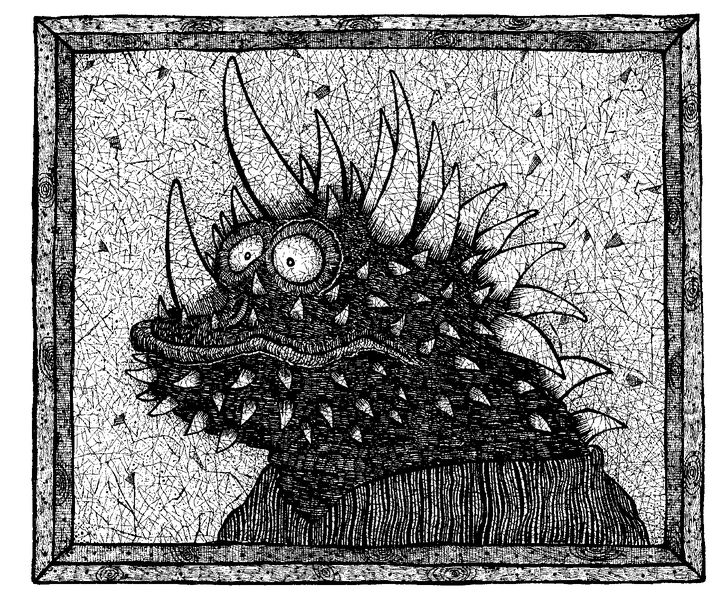
Sure enough, between the front cover and the title page was a folded sheaf of manuscript. Was this what my godfather had raved about so fervently? I removed the ten foxed, yellowish sheets and weighed them in my hand for a moment. Dancelot had not only whetted my curiosity but coupled his revelation with a warning. Reading the story might change my life just as it had changed his, he had predicted. Well, why not? I thirsted for change! I was still young, after all, having only just turned seventy-seven.
The sun was shining outside. Inside the house I felt oppressed by the lingering presence of my late godfather: the smell of his countless pipes, the crumpled balls of paper on his desk, a half-written after-dinner speech, a half-empty teacup and, on the wall, an ancient portrait of him as a youngster with eyes like saucers.
He was still omnipresent, and even the prospect of spending the night alone in the house unnerved me, so I resolved to find a quiet spot and read the manuscript in the open air. Sighing, I made myself a sandwich with some of Dancelot’s home-made strawberry jam and went outside.
I will never, I’m sure, forget that day till I die. The sun had long passed its zenith, but it was still warm and most of the castle’s inhabitants were out and about. The pavement cafés were crowded and sun-loving dinosaurs were lounging on the castle walls, some playing cards, others engrossed in books or reading their latest effusions aloud. The laughter and singing that filled the air were typical of a late summer’s day in Lindworm Castle.
It was far from easy to find a quiet spot, so I strolled on through the streets until I finally began to peruse the manuscript while walking.
My first thought was that every word was in the right place. Well, there was nothing so special about that - every piece of writing makes the same initial impression.
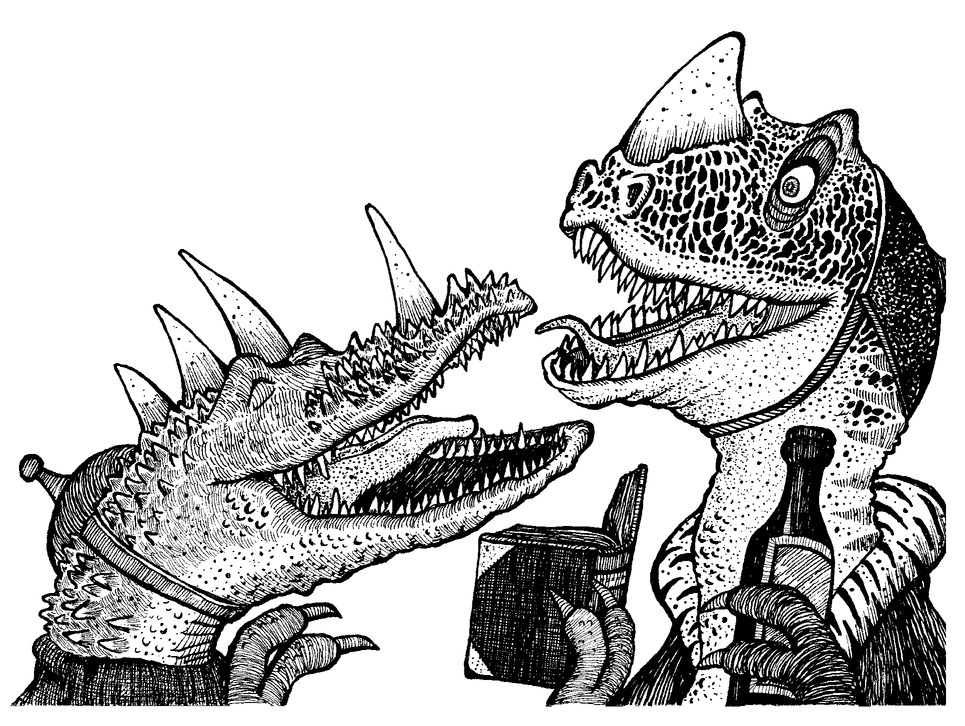
It’s only on closer inspection that one notices occasional solecisms: the misplacing of punctuation marks, the insidious spelling mistakes, the use of cock-eyed metaphors, the spurning of one word where two will do, and all the other blunders a writer can make. But that first page was different. Even without absorbing its contents, I gained the impression that it was a flawless work of art. It resembled the kind of painting or sculpture that tells you at a glance if it’s kitsch or a masterpiece. No handwritten page had ever had that effect on me even before I’d read it. This one looked as if it had been inscribed by a calligrapher. The characters, each of them a work of art in its own right, were choreographed across the page like an enchanting ballet. It was quite some time before I could tear myself away from this captivating general impression and at last begin to read.
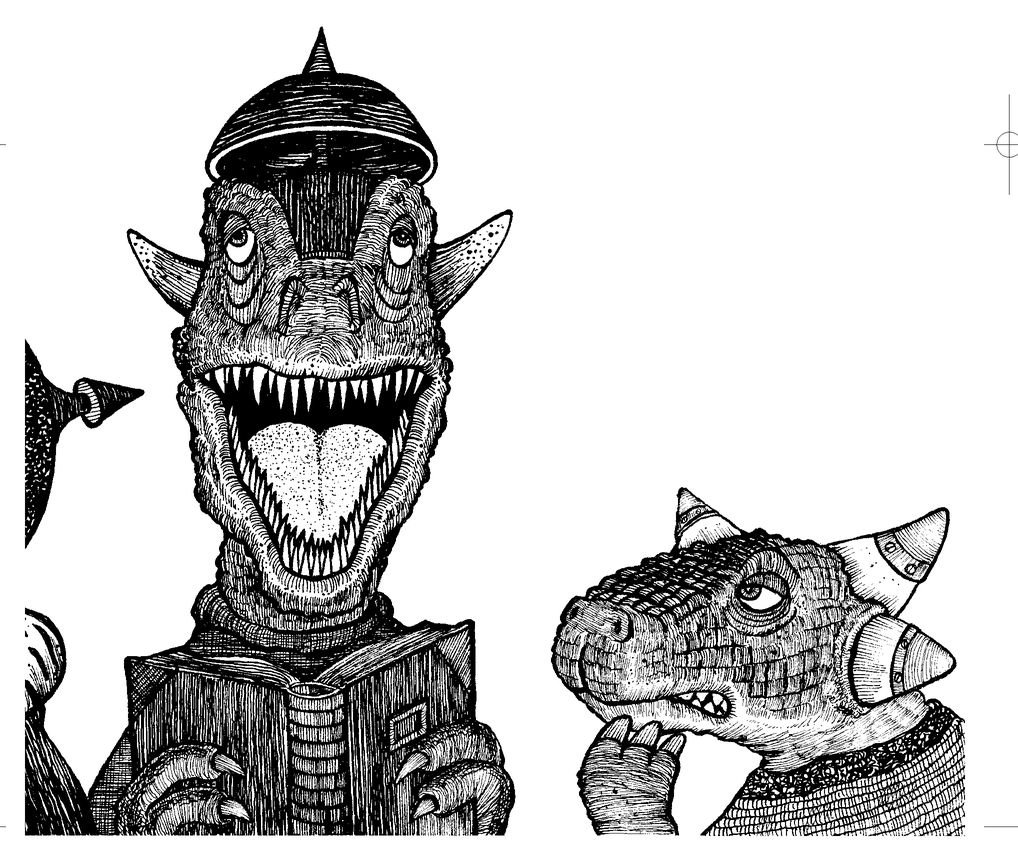
‘Here, every word is
really
in the right place,’ I thought after reading the first page. ‘No, not just every word but every punctuation mark, every comma.’ Even the spaces between the words seemed to be of inalienable importance. And the text itself? I can divulge this much: it conveyed the thoughts of an author in a state of
horror vacui
, or fear of a blank page - an author paralysed by writer’s block and desperately wondering what sentence would best begin his story.
really
in the right place,’ I thought after reading the first page. ‘No, not just every word but every punctuation mark, every comma.’ Even the spaces between the words seemed to be of inalienable importance. And the text itself? I can divulge this much: it conveyed the thoughts of an author in a state of
horror vacui
, or fear of a blank page - an author paralysed by writer’s block and desperately wondering what sentence would best begin his story.
Not a particularly original idea, I grant you. Many essays have been devoted to this classic, almost stereotypical bane of the author’s profession. I must know dozens, a few of them written by myself. They usually testify to the writer’s incompetence, not his greatness: he can’t think of anything, so he writes about his inability to think of anything. He’s like a trumpeter who has forgotten his music and toots away meaninglessly, merely because it’s his job.
But
this
writer’s treatment of a hackneyed idea was so brilliant, so ingenious, so profound and, at the same time, so amusing that I found myself in a state of feverish exuberance after only a few paragraphs. I felt as if I were dancing to heavenly music with a lovely girl dinosaur in my arms, slightly tipsy after imbibing a glass or two of wine. My brain seemed to be rotating on its own axis. Ideas rained down on me like spark-trailing meteors that landed with a hiss on my cerebral cortex. Giggling, they permeated my brain and made me laugh, made me loudly endorse or contradict them. Never had any piece of writing evoked such a lively reaction from me.
this
writer’s treatment of a hackneyed idea was so brilliant, so ingenious, so profound and, at the same time, so amusing that I found myself in a state of feverish exuberance after only a few paragraphs. I felt as if I were dancing to heavenly music with a lovely girl dinosaur in my arms, slightly tipsy after imbibing a glass or two of wine. My brain seemed to be rotating on its own axis. Ideas rained down on me like spark-trailing meteors that landed with a hiss on my cerebral cortex. Giggling, they permeated my brain and made me laugh, made me loudly endorse or contradict them. Never had any piece of writing evoked such a lively reaction from me.
I must have made a thoroughly demented impression as I strutted up and down the street declaiming at the top of my voice, brandishing the letter, laughing hysterically now and then, or stamping my feet with enthusiasm. However, eccentric behaviour in public is the done thing in Lindworm Castle, so no one remonstrated with me. People may have thought that I was rehearsing for some play in which the protagonist had been smitten with insanity.
I read on. The author’s way of writing was so absolutely right, so perfect, that tears sprang to my eyes - something that usually happens only when I’m listening to stirring music. There was an unearthly finality about its grandeur. Sobbing unrestrainedly, I continued to read through a veil of tears until a new idea of the writer’s tickled me so much that my tears abruptly ceased and I roared with laughter. I guffawed like a drunken idiot and pounded my thigh with my fist. By the Orm, how funny it was! I gasped for breath, quietened briefly with one paw clamped to my mouth - and, despite myself, burst out laughing again. As if under some strange compulsion, I repeated the words aloud several times, interrupted by recurrent paroxysms of hysterical laugher. Ha, ha, ha! That was the funniest sentence I’d ever read! An absolute scream, a joke to end all jokes! My eyes now filled with tears of mirth. The punchline was quite spontaneous - I could never have thought of anything as witty, not in my wildest dreams. By all the Zamonian Muses, how stunningly good it was! It was a while before the last great tidal wave of laughter subsided and I could read on, still gasping and wheezing with mirth, still shaken by occasional titters. I had wept buckets and the tears continued to stream down my face. Two distant relations came towards me. They raised their hats with a lugubrious air, believing me overcome with grief for my late godfather. Just then I involuntarily emitted another bellow of mirth, and they walked off quickly pursued by my peals of hysterical laughter. At last I quietened sufficiently to be able to continue reading.
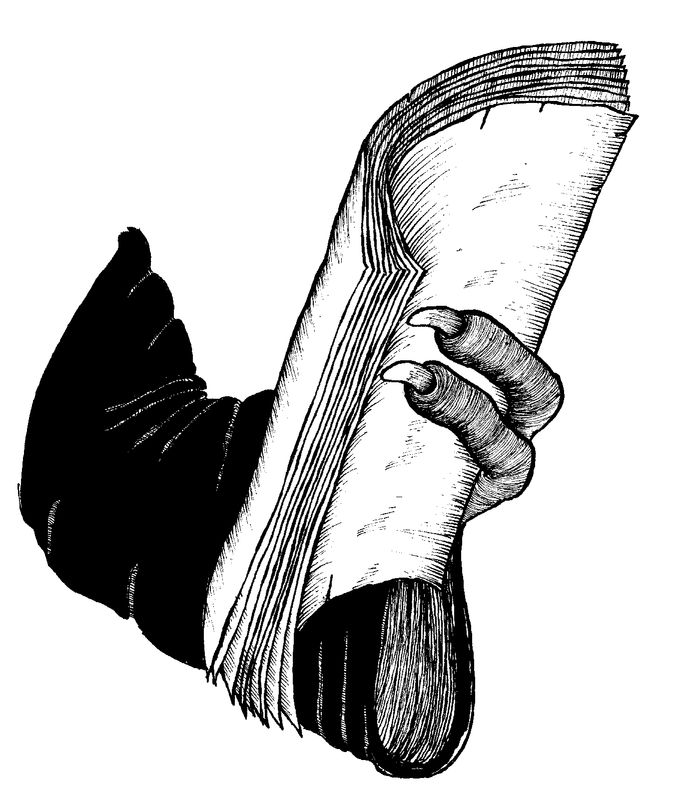
The next page resembled a string of pearls, a series of associations so fresh, so relentlessly original and profound that I felt ashamed of the banality of every sentence I myself had written until then. They transfixed and illumined my brain like shafts of sunlight. I uttered a jubilant cry and clapped my paws several times, but I would sooner have underlined each sentence twice in red and written ‘Yes! Yes! Precisely!’ in the margin. I still remember kissing every word of every sentence that particularly pleased me.
Passers-by shook their heads as they saw me prancing exultantly through the streets with the manuscript in my hand. Those simple characters inscribed on paper had induced a state of sheer ecstasy. Their writer, whoever he was, had transported our profession to a realm that had hitherto been
terra incognita
from my point of view. I breathed heavily, overcome with humility.
terra incognita
from my point of view. I breathed heavily, overcome with humility.
Then came a paragraph that struck an entirely new note - a note as high and clear as that of a glass bell. The words suddenly transmuted themselves into diamonds, the sentences into diadems. These were ideas produced by concentrated intellectual high pressure, words ground and polished into gems of crystalline perfection reminiscent of the precise, unique structure of snowflakes. The cold emanating from them made me shiver, but it wasn’t the mundane frigidity of ice: it was the grand, exalted, eternal chill of outer space. This was creative thought and writing in its purest form. I had never read anything even half as immaculate.
I will quote one sentence from this text, namely, the one with which it ended. It was also the sentence which finally dissolved the writer’s block that had inhibited the author from starting work. I have since used it whenever I myself have been gripped by fear of the blank sheet in front of me. It is infallible, and its effect is always the same: the knot unravels and a stream of words gushes out on to the virgin paper. It acts like a magic spell and I sometimes fancy it really is one. But, even if it isn’t the work of a sorcerer, it is certainly the most brilliant sentence any writer has ever devised. It runs: ‘
This is where my story begins
.’
This is where my story begins
.’
I lowered the manuscript, my knees went weak, and I sank exhausted to the ground - no, let’s be honest, dear readers: I lay down at full length. My ecstasy subsided, my rapture gave way to desolation. Icy rivulets of fear trickled through my veins, filling me with apprehension. Yes, Dancelot had predicted that this manuscript would traumatise me. I wanted to die. How could I ever have presumed to be a writer? What did my amateurish attempts to scribble ideas on paper have in common with the literary sleight of hand I had just witnessed? How could I ever soar to such heights without this writer’s wings of purest inspiration? I began to weep again - bitter, despairing tears this time.
Compelled to step over my supine form, people anxiously enquired what the matter was. I paid them no heed. As if paralysed, I lay there for hours until darkness fell and the stars began to twinkle overhead. Somewhere up there my authorial godfather was smiling down at me.
‘Dancelot!’ I shouted up at the vault of heaven. ‘Where are you? Come and bear me off to your kingdom of the dead!’
‘Pipe down and go home, you drunken sot!’ called an angry voice from a window.
Two nightwatchmen, who probably mistook me for a young and inebriated poet in the throes of creative endeavour (a not entirely false assumption), linked arms with me and conducted me home with many an encouraging cliché (‘You’ll feel better in the morning!’, ‘Time is a great healer!’, et cetera). Once there I flopped down on the bed as if felled by a trebuchet. Not until the small hours did I notice that I was still clutching the jam sandwich, now squashed flat, in my fist.
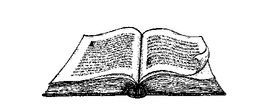
Other books
Dunc and the Haunted Castle by Gary Paulsen
To Open the Sky by Robert Silverberg
Bet Me (Finding My Way) by Burnett, R.S
The Intercept by Dick Wolf
A Trifle Dead: Cafe La Femme, Book 1 by Livia Day
Not Stupid by Anna Kennedy
By Any Means: His Brand New Adventure From Wicklow to Wollongong by Boorman, Charley
Stars, Love And Pirouettes (Dance 'n' Luv Series) by Street, Roy, Alicia Street
Wolves in the Shadows (The Wolf Clan Chronicles) by McLaughlin, Sharon
Stiltsville: A Novel by Susanna Daniel